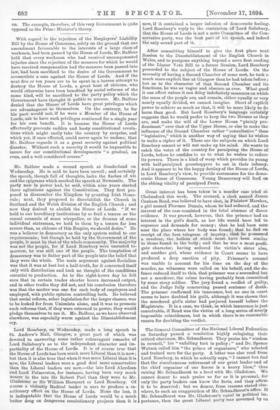Mr. Balfour made a second speech at Sunderland on Wednesday.
He is said to have been unwell ; and certainly the speech, though full of thoughts, lacks the flashes of wit and the epigrams which marked the speech at Newcastle. The party now in power had, he said, within nine years started three agitations against the Constitution. They first pro- posed to dismember the Kingdom by granting Irish Home- rule ; next, they proposed to disestablish the Church in Scotland and the Welsh division of the English Church ; and now they desired to abolish the House of Lords. "If we hold to our hereditary institutions by so frail a tenure as the casual counsels of some wirepuller, or the dreams of some individual statesman, we hold to them by a tenure far less secure than, as citizens of this Empire, we should desire." He was a believer in democracy as the only system suited to our requirements ; but though he held by the Government of the people, it must be that of the whole community. The majority was not the people, for if Lord Rosebery were unseated to- morrow, he was still one of the people. The temptation of democracy was to flatter part of the people into the belief that they were the whole. The main argument against Socialism was that it was at best but a half-truth, for it concerned itself only with distribution and took no thought of the conditions essential to production. As to the eight-hours day he felt sure that in certain trades shorter hours increased output, and in other trades they did not, and his conclusion therefore was that the matter was one for each body of employers and employed, with public opinion controlling both. He believed that social reform, sober legislation for the larger classes, was to be looked for from Unionists alone, and it was to promote such reforms that, if they were returned to power, they would pledge themselves to use it. Mr. Balfour, as we have observed elsewhere, was especially warm against the Disestablishment cry.


















































 Previous page
Previous page